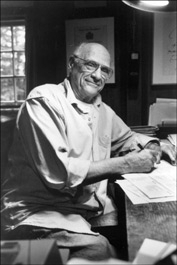NEW YORK, Feb. 15 (JTA) — Arthur Miller will be remembered for his deft dramatic rendering of the American everyman, yet his writing was infused with Jewish characters and themes, both explicit and implicit. But those works dealing most clearly with Jewish issues never received acclaim or recognition equal to that garnered by his earlier work, and have not found as exalted a place in the American theatrical canon. “This is a dimension of Miller’s work which is all too frequently overlooked,” said Ellen Schiff, a scholar of Jewish theater and editor of the anthology “Awake and Singing: Six Great American Jewish Plays,” which includes a play by Miller. Miller died Feb. 10 at age 89. A Pulitzer Prize-winning playwright and author, he reached his greatest professional fame with the creation of Willy Loman, the doomed protagonist of 1949’s “Death of a Salesman.” Though Loman was not specifically identified as a Jew, heated debate ensued through the decades over whether or not he was in fact Jewish, with many insisting he was a composite of Jewish characters Miller had known as a young man. Whereas Jewish authors like Chaim Potok were able to achieve a universality in their work through the depiction of highly specific worlds — Brooklyn Chasidim in Potok’s case — Miller’s work can be viewed through the opposite lens, scholars say: In addressing American themes, Miller gave audiences occasional glimpses into his Jewish core. “In some of his great works, he made Jewish life American life by blurring the focus,” said Jeremy Dauber, a professor of Yiddish language, literature and culture at Columbia University. “How many of us in high school were told that Willy Loman was everyman? What’s interesting is to find how the universal can really be specific.” “Broken Glass” was Miller’s first play to deal explicitly with the American Jewish experience, Schiff said. In the 1994 play — which opened the year after Miller was awarded the Jerusalem Prize — a Jewish man working at a large corporation ingratiates himself with his gentile boss in order to secure his son a spot at West Point. In the meantime, the Jewish man’s wife becomes paralyzed. The play deals “head-on” with two different American Jewish experiences, Schiff said. “One is the experience of the insecure Jew trying to make it in a dimension of American life where Jews rarely tread — in a corporation and in the military. It is the experience of a man who is ashamed of his Jewishness,” she said. “It is also the experience of his wife, who is paralyzed by her repressed husband and unsatisfactory marriage, but is literally paralyzed by reading about the fate of Jews in Europe, particularly after Kristallnacht,” the 1938 pogrom that signaled the upcoming destruction of German Jewry. Miller was born on Manhattan’s Upper West Side in 1915. As a young man whose family was deeply affected by the Great Depression, he worked as a clerk in an auto-parts warehouse and as a truck driver. Miller had a Bar Mitzvah in 1928. After finishing high school, he left for college at the University of Michigan, where he met his first wife. In 1944, Miller saw the first Broadway production of one of his plays, “The Man Who Had All the Luck,” close after just a handful of performances. In 1947, however, the play “All My Sons” opened on Broadway and was a great success. Two years later, “Death of a Salesman” opened, winning the Pulitzer Prize, the Tony Award for best play and the New York Drama Critics’ Circle Award. Miller wrote the play in just six weeks. “The Crucible” opened in 1953, followed by 1955’s “A View From the Bridge.” In 1956, Miller married actress Marilyn Monroe. The marriage to the film superstar gained him further international fame, but it was a rocky union and ended in 1961. The next year Miller married photographer Inge Morath, who died in 2002. The poet and writer Honor Moore, who was a friend of Miller’s, told JTA that Miller viewed himself as an atheist and saw religion as “the opiate of the people.” Miller wrote from a humanist perspective born of his experience living through the Depression and a “post-war optimism about the possibilities of democracy,” Moore said. “He saw his task as to write, to portray those people in real American life.” In 2002, Miller — who wrote 17 plays in all — visited a class Moore was teaching at Columbia, where a student asked him about the significance of writing. “He said that he thought it was the most important thing these writing students could do, because art lasts,” Moore recalled. “He said that there were lawyers in Aeschylus’ time, but we remember Aeschylus because we have his plays.” Among Miller’s other explicitly Jewish plays was “After the Fall,” in which Miller invokes a setting that, Schiff said, was “clearly a reference to the camps.” “Incident at Vichy” addresses the round-up of Jews in wartime France. In it, a French Jewish psychiatrist, asked what it means to be a Jew, says, “Jew is only that name we give to that stranger, that agony we cannot feel, that death we look on like a cold abstraction.” Miller also wrote a television script based on the memoirs of the French chanteuse Fania Fenelon, who survived the Holocaust playing in an orchestra at Auschwitz. Also notable was Miller’s 1945 novel about anti-Semitism, “Focus.” “As temporal concerns fall away he will truly be seen as one of the very great American writers,” Moore said. Indeed, as the English director Nicholas Hytner once said, “In England we revere him as one step above God and one step below Shakespeare.”
JTA has documented Jewish history in real-time for over a century. Keep our journalism strong by joining us in supporting independent, award-winning reporting.






